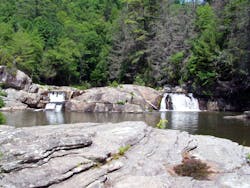Santa Ana River Watershed Basin Study Completed
Bureau of Reclamation Commissioner Michael L. Connor released the Santa Ana River Watershed Basin Study, which addresses water supply and demand projections for the next 50 years and identifies potential climate change impacts to Southern California's Santa Ana River Watershed. This study is a first of its kind for the predominately urban basin. It encompasses approximately 2,600 square miles in Orange, Riverside and San Bernardino counties and is home to more than 6 million residents.
The Santa Ana Watershed Basin Study, completed in partnership with the Santa Ana Watershed Project Authority (SAWPA), generated several tools to help SAWPA, its member agencies, and water sector stakeholders comply with California Assembly Bill 32 requirements to achieve 1990 greenhouse gas emission levels by 2020. A climate change analysis developed by Reclamation was also used by SAWPA to prepare an array of adaptation strategies to deal with the potential effects of climate change.
Authorized by the 2009 SECURE Water Act, the Basin Study analyzes future water supply and demand scenarios based on factors such as projected changes in climate, and varying levels of growth for municipal, agricultural and business interests in the Santa Ana River Watershed. Highlights of the two-year study include SAWPA and Reclamation hosting two well-attended climate change science workshops, development and analysis of basin adaptation strategies, creation of a greenhouse gas (GHG) emissions calculator for the water sector to help member agencies meet California's mandated GHG emission standards by 2020, development of a groundwater screening tool, and creation of a series of 'frequently asked questions' that can assist basin water sector leaders in their decision-making.
The report found this watershed has challenges due to climate change and growing populations. The challenges in this watershed include increasing demand, earlier snowmelt and runoff, and faster than historical sea level rise threatening coastal communities, water infrastructure and groundwater basins.
The results of the study are posted on Reclamation's website. Copies are also available on CD and can be requested by contacting Reclamation's Study Manager Jack Simes at 951.695.5310.
Source: Bureau of Reclamation
